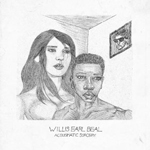|
|
 |
Dusted Reviews
Artist: Willis Earl Beal Album: Acousmatic Sorcery Label: XL Review date: Apr. 3, 2012 |

|
|
|
 |
What to make of Willis Earl Beal? His website divulges a few particulars: a Chicago P.O. Box address and a hand-sketched self portrait along with standing offers to visitors who write or call him to receive a drawing via mail or serenade via Skype in return. There are also links to samples of his novel and an animated video for “Evening’s Kiss,” one of the 11 tracks on Acousmatic Sorcery, his debut album. This latter document communicates a clutch of other clues, but there’s still a large amount about his background, methods and creative persona(s) that remains resistant to easy parsing, while still actively inviting the curious to try.
Sounding home-recorded and intentionally lo-fi for much of its duration, the album’s 11 songs are rife with anecdotal imagery that shifts freely between allegory and reality, ranging from amateurish to inspired. This creative variability between highly referential insight and over-reaching self indulgence brings other insular artists like Jandek and Otis Taylor immediately to mind. Beal crafts backing tracks that are often little more than sparse chords carved out on flea market guitar and zither, then treated with liberal looping and echo. His vocals vary similarly in terms of clarity and intelligibility, from the muffled moroseness of “Monotony” to the clear delivery of “Away My Silent Lover,” which sounds peculiarly akin to the sort of intimate song kernels Jimi Hendrix used to work out and record in his hotel rooms.
“Take Me Away” dials back to fife and drum-driven church music, with a pounding metallic beat that would make Tom Waits crack a wolfish smile. Beal overdubs himself and does a credible job mirroring the raw zeal of a country pulpit preacher. “Ghost Robot” and “Swing On Low” are built on similar metal factory rhythms, with Beal rhyming lengthier verses in a proto-rap fashion that isn’t entirely convincing in comportment or content. The instrumental “Nepenenoyka” and fantastical “Bright Copper Noon” find him experimenting with ringing resonances on his strings to create curious lullaby-like lattices.
PR on the album seems to be playing up Beal’s bouts with depression and experiences with homelessness as fermenting pools for his musical idiosyncrasies. Independent of that rising buzz, as a listening experience this first effort still feels quite a bit less than fully formed. It’s a collection of veiled promise, but only partial pay-off.
By Derek Taylor
|







